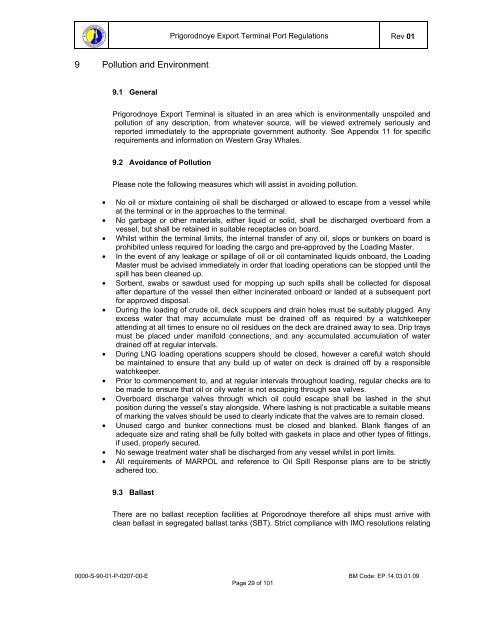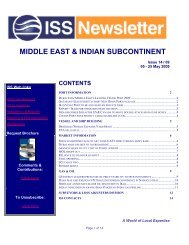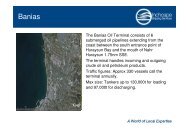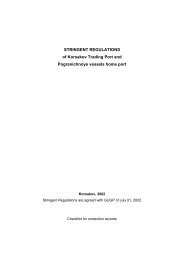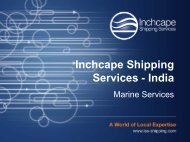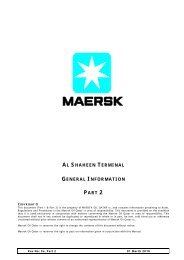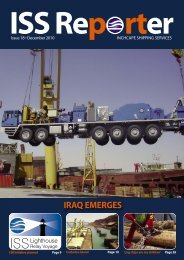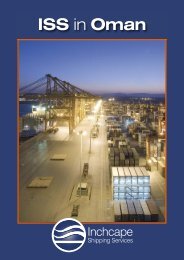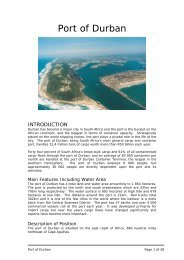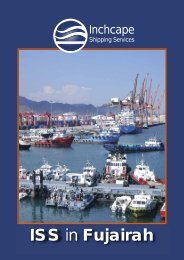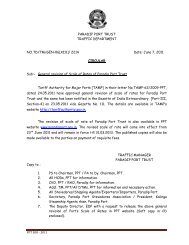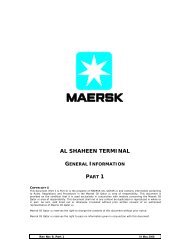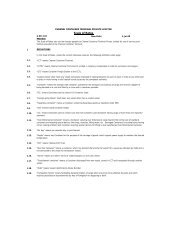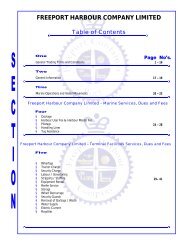Prigorodnoye Export Terminal Port Regulations.pdf - Inchcape ...
Prigorodnoye Export Terminal Port Regulations.pdf - Inchcape ...
Prigorodnoye Export Terminal Port Regulations.pdf - Inchcape ...
Create successful ePaper yourself
Turn your PDF publications into a flip-book with our unique Google optimized e-Paper software.
<strong>Prigorodnoye</strong> <strong>Export</strong> <strong>Terminal</strong> <strong>Port</strong> <strong>Regulations</strong> Rev 01<br />
9 Pollution and Environment<br />
9.1 General<br />
<strong>Prigorodnoye</strong> <strong>Export</strong> <strong>Terminal</strong> is situated in an area which is environmentally unspoiled and<br />
pollution of any description, from whatever source, will be viewed extremely seriously and<br />
reported immediately to the appropriate government authority. See Appendix 11 for specific<br />
requirements and information on Western Gray Whales.<br />
9.2 Avoidance of Pollution<br />
Please note the following measures which will assist in avoiding pollution.<br />
• No oil or mixture containing oil shall be discharged or allowed to escape from a vessel while<br />
at the terminal or in the approaches to the terminal.<br />
• No garbage or other materials, either liquid or solid, shall be discharged overboard from a<br />
vessel, but shall be retained in suitable receptacles on board.<br />
• Whilst within the terminal limits, the internal transfer of any oil, slops or bunkers on board is<br />
prohibited unless required for loading the cargo and pre-approved by the Loading Master.<br />
• In the event of any leakage or spillage of oil or oil contaminated liquids onboard, the Loading<br />
Master must be advised immediately in order that loading operations can be stopped until the<br />
spill has been cleaned up.<br />
• Sorbent, swabs or sawdust used for mopping up such spills shall be collected for disposal<br />
after departure of the vessel then either incinerated onboard or landed at a subsequent port<br />
for approved disposal.<br />
• During the loading of crude oil, deck scuppers and drain holes must be suitably plugged. Any<br />
excess water that may accumulate must be drained off as required by a watchkeeper<br />
attending at all times to ensure no oil residues on the deck are drained away to sea. Drip trays<br />
must be placed under manifold connections, and any accumulated accumulation of water<br />
drained off at regular intervals.<br />
• During LNG loading operations scuppers should be closed, however a careful watch should<br />
be maintained to ensure that any build up of water on deck is drained off by a responsible<br />
watchkeeper.<br />
• Prior to commencement to, and at regular intervals throughout loading, regular checks are to<br />
be made to ensure that oil or oily water is not escaping through sea valves.<br />
• Overboard discharge valves through which oil could escape shall be lashed in the shut<br />
position during the vessel’s stay alongside. Where lashing is not practicable a suitable means<br />
of marking the valves should be used to clearly indicate that the valves are to remain closed.<br />
• Unused cargo and bunker connections must be closed and blanked. Blank flanges of an<br />
adequate size and rating shall be fully bolted with gaskets in place and other types of fittings,<br />
if used, properly secured.<br />
• No sewage treatment water shall be discharged from any vessel whilst in port limits.<br />
• All requirements of MARPOL and reference to Oil Spill Response plans are to be strictly<br />
adhered too.<br />
9.3 Ballast<br />
There are no ballast reception facilities at <strong>Prigorodnoye</strong> therefore all ships must arrive with<br />
clean ballast in segregated ballast tanks (SBT). Strict compliance with IMO resolutions relating<br />
0000-S-90-01-P-0207-00-E<br />
Page 29 of 101<br />
BM Code: EP.14.03.01.09


